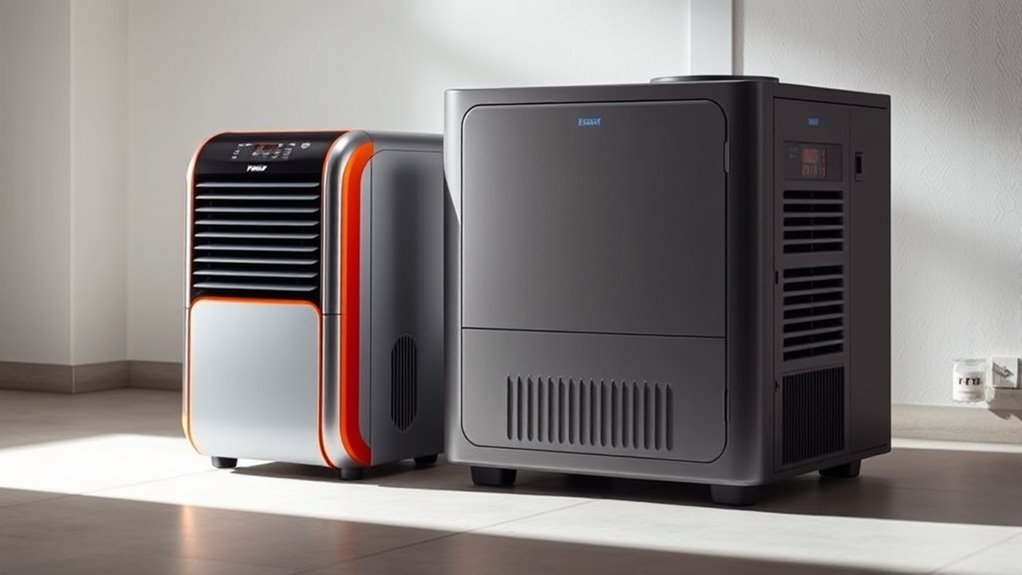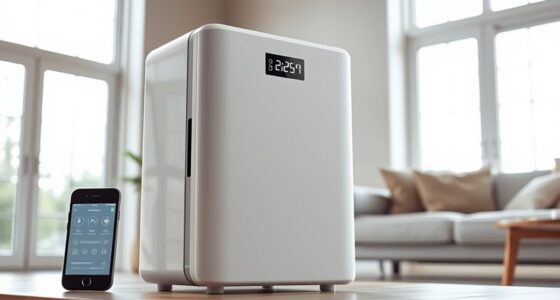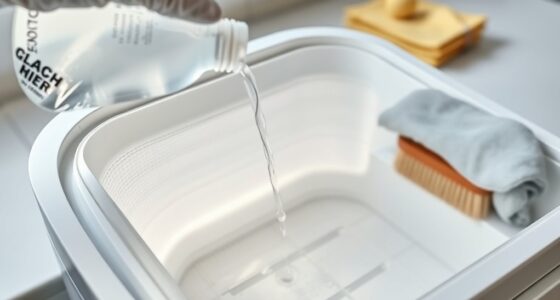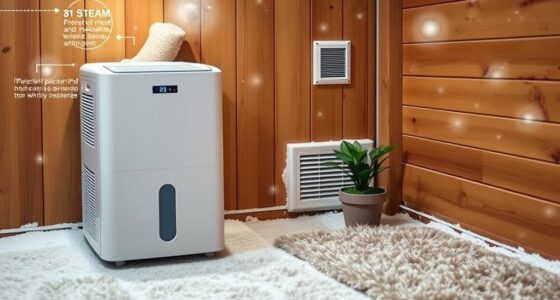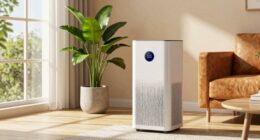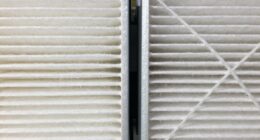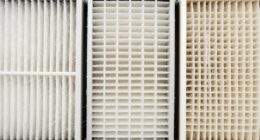If you want a quieter, energy-efficient option for cold or poorly insulated spaces, a desiccant dehumidifier is ideal. These units excel in low temperatures and are portable, but they may work less effectively in hot conditions. Compressor models are better for warm, humid environments, removing moisture quickly but tend to be noisier and consume more energy. To find out which type fits your space and needs best, explore the details further.
Key Takeaways
- Desiccant dehumidifiers are quieter, energy-efficient in cold conditions, and portable, ideal for cold, poorly insulated spaces.
- Compressor dehumidifiers work faster in warm, humid environments but use more energy and produce more noise.
- Desiccant units perform better at low temperatures, while compressors excel in high-temperature, high-humidity settings.
- Desiccant dehumidifiers are lightweight and suitable for small or mobile spaces; compressors are better for large, fixed installations.
- Choosing depends on climate, noise preferences, energy efficiency needs, and the specific environment’s temperature and humidity.
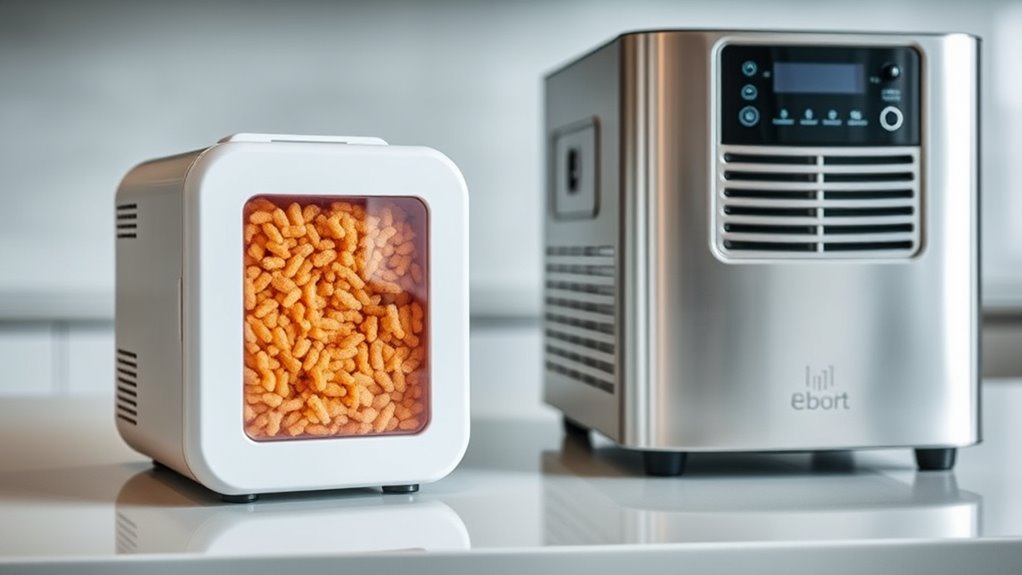
Are you unsure which type of dehumidifier is right for your needs? Deciding between a desiccant and a compressor dehumidifier depends on several factors, including energy efficiency, noise levels, and your specific environment. Both types serve the purpose of reducing humidity, but they operate differently and have unique advantages and drawbacks.
Desiccant dehumidifiers use a moisture-absorbing material, often silica gel or a similar substance, to pull humidity from the air. They tend to be more energy efficient at lower temperatures, making them ideal for spaces that are cold or poorly insulated. Since they don’t rely on refrigeration cycles, they generally consume less power in cooler conditions, which can save you money on electricity bills over time. However, at higher temperatures, they might become less efficient. When it comes to noise levels, desiccant units are typically quieter because they lack the compressor noise associated with refrigerant-based systems. If you’re placing it in a bedroom, office, or a quiet workspace, a desiccant dehumidifier can operate smoothly without disturbing your environment. Additionally, desiccant dehumidifiers are often more lightweight and portable, making them easier to move around as needed.
Desiccant dehumidifiers are quieter and more energy-efficient in cold, poorly insulated spaces.
Compressor dehumidifiers, on the other hand, use a refrigeration cycle similar to an air conditioner. They condense moisture from the air into a collection tank or drain hose. These units are usually more effective in higher temperature and humidity conditions, making them suitable for basements or large areas with consistent warmth. Regarding energy efficiency, compressor models tend to consume more power, especially in colder environments where they struggle to operate efficiently. They also generate more noise due to their compressor and fan operation, which might be a concern if you need a quiet space or plan to run the unit overnight. Still, in warmer conditions, compressor dehumidifiers are often more effective at removing moisture quickly.
Ultimately, your choice depends on your climate, the space you’re dehumidifying, and your comfort preferences. If you prioritize energy efficiency and quieter operation in cooler environments, a desiccant dehumidifier might be the better fit. Conversely, if you’re dealing with higher temperatures and want faster moisture removal, a compressor model could serve you better, despite its higher energy use and noise. Understanding these differences will help you select the most suitable dehumidifier for your needs, ensuring a comfortable and moisture-free environment. For example, knowing that climate conditions play a significant role can guide your decision-making process.
Frequently Asked Questions
Which Dehumidifier Type Is More Energy-Efficient Long-Term?
If you’re wondering which dehumidifier is more energy-efficient long-term, consider that compressor models generally have lower energy consumption and better cost efficiency in most conditions. They use less power to remove moisture, especially in high humidity environments. Desiccant units can be more effective in colder conditions but often consume more energy, making them less ideal for long-term use if energy savings are your priority.
Can Desiccant Dehumidifiers Operate Effectively in Very Cold Environments?
You might notice that desiccant dehumidifiers work well in cold environments, thanks to their temperature sensitivity. Unlike compressor models, they don’t rely on warm air for operation, so they maintain heating performance even in very low temperatures. This makes them ideal for unheated spaces or basements during winter. Their ability to operate effectively in cold conditions guarantees you stay dry without sacrificing performance, no matter how chilly it gets.
Are Compressor Dehumidifiers Suitable for Continuous Operation?
Yes, compressor dehumidifiers are suitable for continuous operation, especially if you need consistent humidity control. They’re designed for operational stability, making them ideal for maintaining a steady environment in basements or large spaces. Keep in mind, though, they may generate more noise and require regular maintenance. If you want reliable humidity control around the clock, a compressor dehumidifier can be an effective choice for continuous use.
How Do Maintenance Requirements Differ Between Desiccant and Compressor Units?
When it comes to maintenance, you’ll find desiccant units are low-maintenance, mainly needing filter replacements and occasional recharging. Compressor dehumidifiers, however, demand more attention, like refrigerant refilling and cleaning coils. Think of it as tending a garden; desiccant units are easy to keep blooming, while compressor models require regular upkeep to keep them humming smoothly. Your choice depends on how much time you’re willing to invest.
Which Dehumidifier Type Is More Environmentally Friendly?
You might wonder which dehumidifier type is more environmentally friendly. Generally, desiccant units have a lower recycling impact because they use less energy and contain fewer refrigerants, which are harmful to the environment. Compressor models often rely on refrigerants and consume more power, affecting material sustainability and increasing their carbon footprint. Choosing a desiccant dehumidifier can reduce your environmental impact, making it a greener option overall.
Conclusion
Choosing between desiccant and compressor dehumidifiers depends on your needs. Desiccant units excel in cold conditions, while compressors handle larger spaces efficiently. Did you know that compressor dehumidifiers can remove up to 70 pints of moisture daily? This highlights their suitability for bigger areas. Consider your environment and requirements carefully—selecting the right dehumidifier can improve air quality and protect your space effectively. Make an informed choice for a healthier, more comfortable home.
